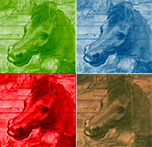How to access
Call for proposals
IPERION HS offers free-of-charge access to more than 100 state-of-art scientific techniques and 14 archives, distributed in 16 countries. Single or multi-technique proposals are to be addressed to one of the three advanced transnational platforms ARCHLAB, FIXLAB and MOLAB. IPERION HS selects the best proposals and covers the costs of this activity.
Proposals must be submitted online through the application form, at any time, with two evaluation cut-off deadlines a year.
How to submit a proposal
The users are strongly encouraged to contact the Access Office (access@iperionhs.eu) to discuss both the administrative and scientific issues on how to prepare the proposal. This process strongly improves user projects and gives more chances for a successful application!
To submit a new proposal, the User Group Leader needs to create an IPERION HS account. Once registered, the User Group Leader must log in with username and password, browse the IPERION HS catalogue of services to find the suitable analysis or archive to be accessed and insert the choice/s in the basket. Then the User Group Leader will fill the application form in with the following information:
- General information (title, objectives, scientific discipline)
- Participants
- Proposal description (download the template, complete and upload in pdf)
- Check and submit.
After the submission, the User Group Leader will receive a link by email to activate the access procedure.
Financial information
IPERION HS access is free of charge for eligible users.
For the MOLAB platform, the following costs are included:
- All instruments transportation and travel insurance;
- Access is free of charge for users respecting the MOLAB staff’s journey and accommodation, technologic and scientific support.
Users are liable to:
- provide insurance for the artwork object and personnel throughout the measurements;
- supply any specific logistics (scaffolding, health and safety requirements) to exploit the MOLAB equipment in the best conditions and security.
Who can apply?
User Groups can apply for Transnational Access in case they meet the following conditions:
(a) the User Group Leader and the majority of the User Group members work in an institution/SME established in a Member State of the European Union, an EU Associated State or a developing country.
(b) the User Group Leader and the majority of the User Group members work in an institution/SME located in a country other than the country where the legal entity operating the infrastructure is established.
(c) only User Groups that are entitled to disseminate the foreground they have generated under the project are eligible to benefit from access free of charge to the infrastructure.
Evaluation and criteria
After the proposals are submitted, the Access Office and the platforms’ coordinators will verify the formal compliance with the EU regulations. After this first check, the proposals are evaluated:
- From a technical point of view. This evaluation is performed by the scientist(s) in charge of the requested tools and aims to determine the technical feasibility of the analysis and the coherence of the day/hour requested. In case the User Group Leader has submitted a multi-analysis proposal, its feasibility will be checked by all the scientists in charge of the tools. In case the proposal will be considered feasible for all the tools, the User Group Leader will receive an email with a confirmation that the proposal will be sent to the Peer Review Panel (PRP) for the scientific evaluation. In case, one of the tools will be considered not feasible, the User Group Leader will receive an email to contact the Access Office.
- From a scientific point of view. This evaluation is performed by an independent, international panel of experts (PRP), recognised for their expertise in the field of conservation and scientific studies of Cultural Heritage. Project proposals will be selected on a competitive basis (scientific excellence, novelty and impact). The Peer Review Panel evaluates the scientific content of the project and ranks the proposals. Each access facility will make a final decision concerning the extent of access provided to the User Group (number of days, a period of the visit, facility’s internal rules, IPR issues, etc.). The applications should aim to increase the scientific output (qualitatively and quantitatively), optimize the use of local expertise of ongoing research activities and facilities, and foster lasting international science cooperation.
At the end of the evaluation, the Access Office will send an email to the User Group Leader with the result of the final decision.
In case of a positive evaluation, the User Group Leader should contact the facility/ies in advance to agree about the access. The scheduled access should, in general, occur no later than 12 months after the final evaluation.
In the highly unfortunate event that a User cannot avail of granted access, a written and signed declaration is necessary from the User Group Leader and it must be sent to the Access Office (access@iperionhs.eu).
FAQs
What is the typical duration of a TNA project?
The typical duration of a TNA user project may vary from about one day up to one month.
Can I apply for a facility located in my country?
The User Group leader and the majority of the User Group must work in a country other than the one where the requested infrastructure is located.
When will I know if my proposal has been approved?
The entire evaluation process is expected to be completed in few weeks after the submission deadline. Your proposal is requested to pass both the technical and scientific evaluation. The IPERION HS Access Office will send an email to you for informing about the feasibility of your project and the final decision.
Will I have duties as user after the access?
Within 2 weeks from the completed access, each User Group Leader of a supported user-project will receive an email with complete instructions (users’ duties) on what to do.
All the results raising from the access should be published preferably in open access with the proper acknowledgement.
